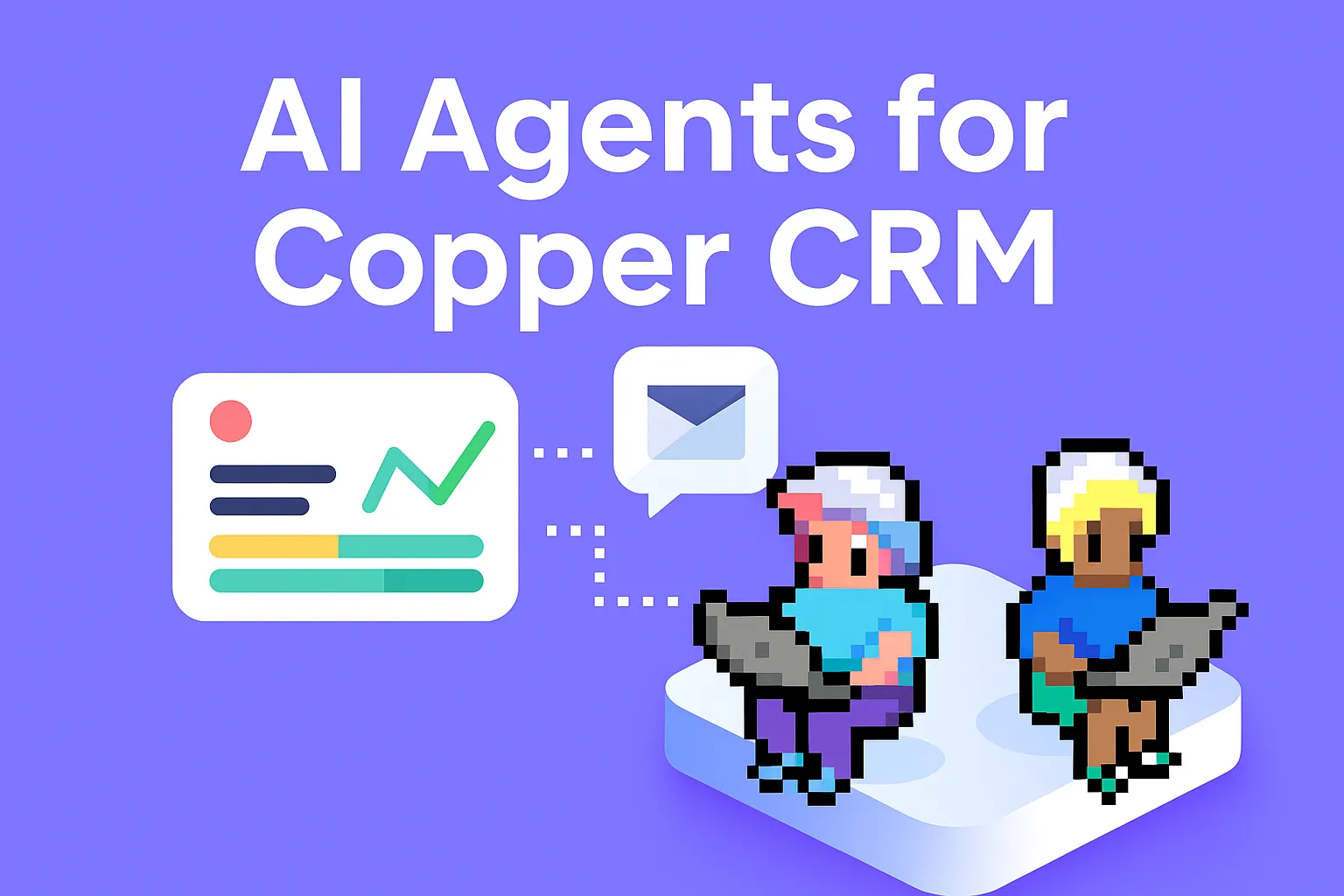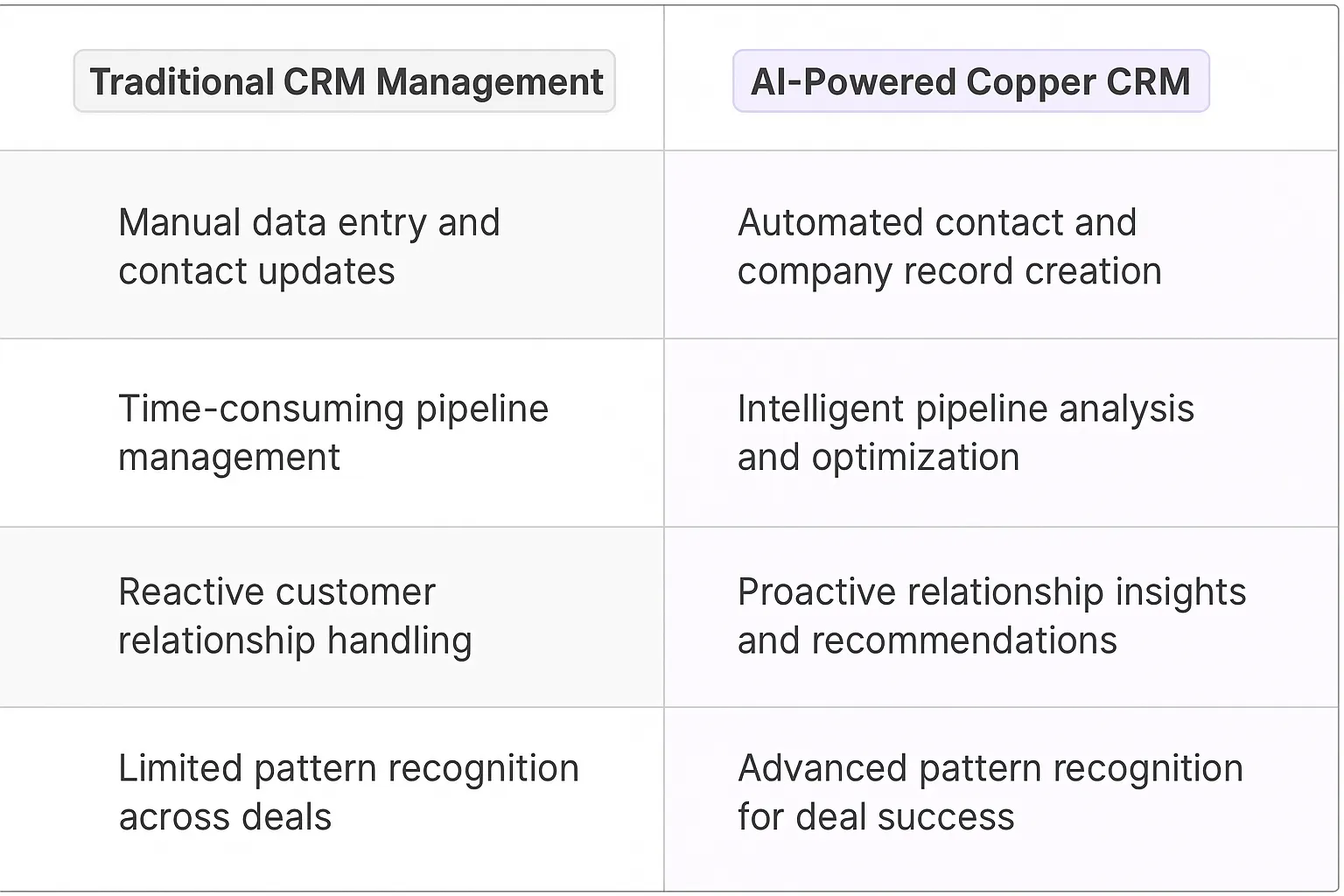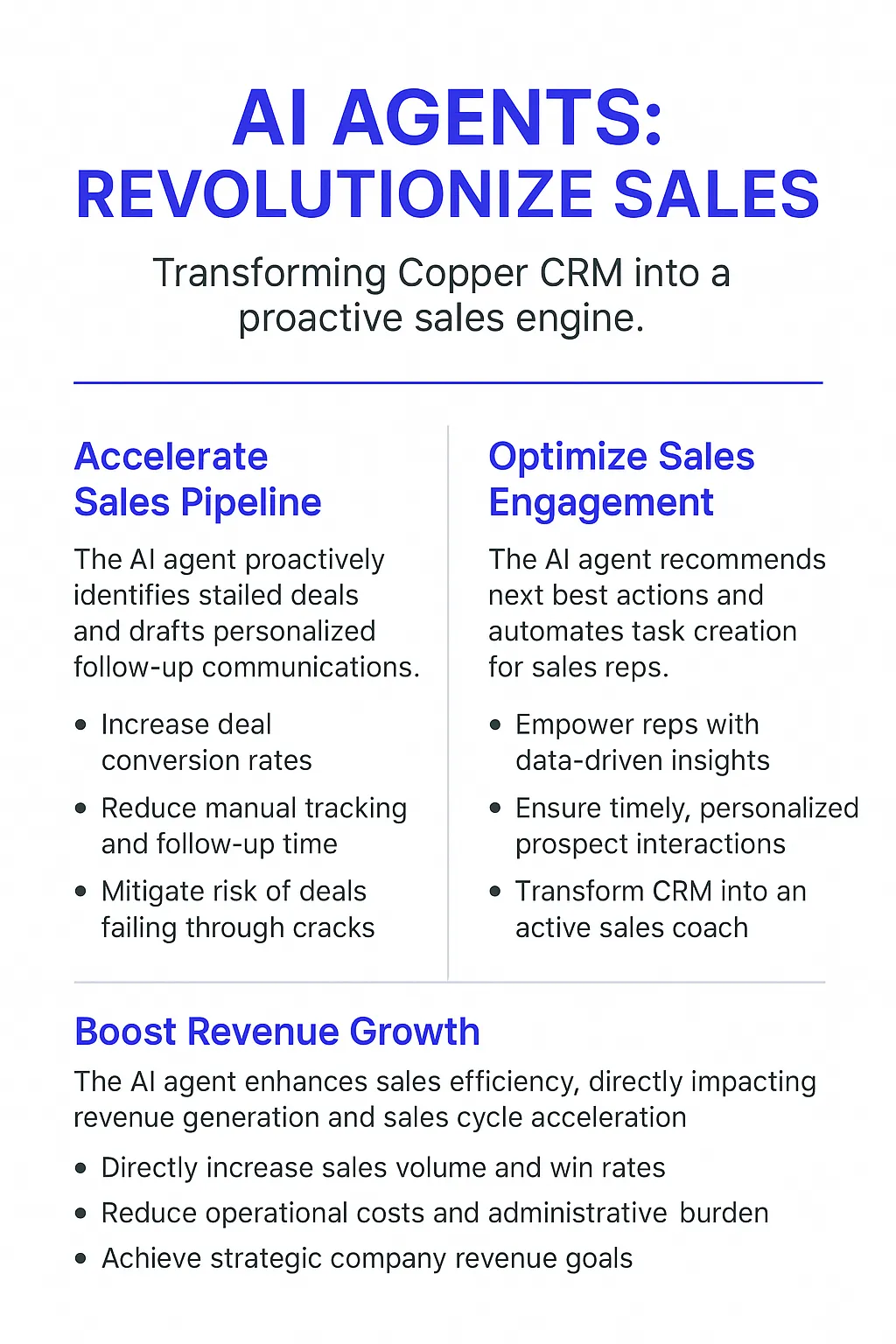Copper
Understanding Copper's Core Platform and Features
What is Copper?
Copper is a relationship-focused CRM platform designed to eliminate manual data entry and automate customer relationship management. Built with deep Google Workspace integration, it automatically captures and organizes customer data from emails, calendar events, and other touchpoints. The platform focuses on delivering a frictionless experience that helps teams build and maintain stronger customer relationships.
Key Features of Copper
- Native Google Workspace integration for seamless email and calendar sync
- Automated contact and company profile creation
- Visual pipeline management with customizable stages
- Activity tracking and relationship insights
- Custom fields and workflow automation
- Advanced reporting and analytics capabilities
- Mobile apps for iOS and Android

Benefits of AI Agents for Copper
What would have been used before AI Agents?
Sales teams using Copper CRM traditionally relied on manual data entry, repetitive follow-ups, and time-consuming pipeline management. Account executives spent hours updating contact records, scheduling meetings, and trying to identify the right moments to engage prospects. The standard workflow involved toggling between email, calendar, and CRM tabs while maintaining detailed notes on every customer interaction.
What are the benefits of AI Agents?
AI Agents transform Copper CRM from a static database into a dynamic digital teammate that actively participates in the sales process. These agents analyze communication patterns, customer behaviors, and historical data to surface actionable insights that drive deals forward.
The most significant impact comes from the agents' ability to automate relationship-building tasks. They monitor email threads, identify when prospects go cold, and suggest personalized re-engagement messages based on previous successful interactions. This creates a multiplier effect - sales reps can maintain meaningful connections with 3-4x more prospects without sacrificing quality.
AI Agents also excel at pattern recognition across the entire customer journey. They identify common objections, successful response strategies, and optimal timing for follow-ups. This institutional knowledge gets codified and distributed across the team, helping new sales reps ramp up faster and experienced reps consistently hit their targets.
The real game-changer is how these agents handle data hygiene. Instead of sales reps manually logging activities, AI Agents automatically capture and categorize interactions, update contact information, and flag important changes in customer status. This gives sales leaders real-time visibility into their pipeline without creating additional overhead for their teams.
For growing sales organizations, AI Agents effectively create a force multiplier - enabling lean teams to execute sophisticated, multi-touch sales motions that previously required much larger headcounts. The result is more deals closed with less manual effort.

Potential Use Cases of AI Agents with Copper
Processes
- Deal pipeline analysis and optimization - AI agents scan historical deal data to identify patterns in successful closes, suggesting optimal next steps for sales reps
- Customer communication monitoring - Digital teammates analyze email threads and meeting notes to surface critical customer needs and sentiment shifts
- Sales forecasting enhancement - AI agents process pipeline data, win/loss patterns, and market signals to generate more accurate revenue projections
- Lead qualification automation - Smart filtering of new prospects based on ideal customer profile matching and engagement signals
- Account health monitoring - Proactive identification of at-risk accounts through analysis of multiple engagement metrics
Tasks
- Auto-population of contact and company records from email signatures and web sources
- Meeting note summarization and action item extraction
- Follow-up email drafting based on conversation context and best practices
- Deal stage progression recommendations based on activity patterns
- Automated task creation and assignment based on customer interactions
- Custom field updates based on email and calendar activity
- Opportunity amount suggestions based on similar historical deals
- Contact role mapping across complex buying committees
Growth Impact Analysis
The integration of AI agents into Copper CRM represents a fundamental shift in sales operations. Rather than basic automation, these digital teammates function as force multipliers for sales teams. They eliminate the cognitive overhead of manual data entry and pipeline management, allowing reps to focus on high-value customer interactions.
The network effects become particularly powerful as AI agents learn from aggregate user behaviors across organizations. Each successful deal, each productive customer interaction, and each accurate forecast contributes to increasingly sophisticated pattern recognition.
For scaling companies, this translates into compressed sales cycles, improved win rates, and more accurate resource allocation. Sales leaders gain unprecedented visibility into pipeline health while individual reps benefit from AI-powered guidance that evolves with their selling motion.
The most successful implementations will be those that view AI agents not as replacement technology but as collaborative tools that enhance human judgment and relationship building capabilities. This augmentation approach drives both top-line growth through improved sales effectiveness and bottom-line efficiency through automated workflow optimization.

Industry Use Cases
AI agents integrated with Copper CRM create powerful new possibilities for sales teams, customer success managers, and business development professionals. These digital teammates enhance how organizations handle customer relationships and sales processes across multiple sectors. The real magic happens when AI agents start handling the intricate dance of prospect communication, deal tracking, and relationship nurturing that traditionally consumed countless human hours.
What makes these use cases particularly compelling is how they address the core friction points in customer relationship management. Rather than just automating basic tasks, AI agents in Copper fundamentally transform how teams engage with their CRM data and customer interactions. They operate as proactive partners that surface insights, identify patterns, and take action at critical moments in the sales and relationship cycle.
The following industry examples demonstrate how AI agents adapt to different business contexts while maintaining the human element that's essential for meaningful customer relationships. Each case highlights specific pain points these digital teammates solve and the measurable impact they deliver.
Technology Companies: Scaling Customer Success with Copper AI
Technology companies face a unique challenge - managing exponential customer growth while maintaining personalized relationships. The Copper AI Agent transforms how SaaS and technology firms handle customer success by analyzing patterns across thousands of interactions.
When integrated into a tech company's workflow, the AI Agent automatically identifies customer health signals from email exchanges, calendar meetings, and support tickets. It spots early warning signs like decreased product usage or delayed responses that could indicate churn risk.
For example, a B2B software company selling to enterprise clients can have the AI Agent monitor communication patterns with key stakeholders. The agent detects when engagement drops with certain contacts and proactively suggests relationship-building actions to the account manager - whether that's scheduling a quarterly business review or sharing relevant case studies.
The AI Agent also enriches customer profiles by extracting insights from unstructured conversations. It identifies which features customers use most, their primary pain points, and expansion opportunities - creating a dynamic view of each account that goes far beyond basic contact details.
Most critically for tech companies, the AI Agent helps scale institutional knowledge. When new customer success managers join, they gain immediate access to analyzed historical context about their accounts. The agent surfaces relevant past interactions, notable milestones, and relationship dynamics that would typically take months to understand.
This intelligence layer fundamentally changes how tech companies grow and retain customers. Rather than reactively responding to issues, teams can get ahead of problems and systematically strengthen relationships through data-driven insights.
Professional Services: Elevating Client Relationships Through AI-Powered Intelligence
Professional services firms live and die by their ability to deeply understand client needs and deliver exceptional value. The Copper AI Agent fundamentally transforms how consulting, legal, and advisory firms manage their most critical asset - long-term client relationships.
The AI Agent's power comes from its ability to surface hidden patterns across hundreds of client touchpoints. For a management consulting firm, the agent analyzes email threads, meeting notes, and project deliverables to build a rich understanding of each client's strategic priorities and organizational dynamics.
A compelling example is how a boutique strategy consulting firm deployed the AI Agent to strengthen their key accounts. The agent identified that their most successful client relationships involved regular cadence of informal check-ins between major projects. Armed with this insight, the firm adjusted their account management approach to incorporate more frequent lightweight touchpoints.
The agent also acts as an institutional memory bank, preserving crucial relationship context that often gets lost during team transitions. When a new partner takes over an account, the AI surfaces critical details like the client's communication preferences, past project challenges, and which approaches resonated most effectively.
Beyond relationship management, the agent helps firms capture more value from their expertise. It analyzes successful project outcomes and methodologies, helping teams replicate winning approaches across accounts. The AI can identify when similar challenges emerge across different clients, enabling firms to leverage proven solutions.
For professional services firms competing on insight and expertise, the AI Agent creates a multiplier effect - enabling small teams to maintain deep relationships with larger client portfolios while ensuring consistent service quality. This intelligence layer transforms how firms scale their most valuable asset: their collective knowledge and relationship capital.
Considerations and Challenges
Implementing AI agents within Copper CRM requires careful planning and strategic consideration across multiple dimensions. The integration process presents both technical hurdles and operational complexities that organizations need to navigate.
Technical Challenges
Data quality stands as a primary technical obstacle. AI agents require clean, structured data to function effectively within Copper's environment. Many organizations struggle with inconsistent data entry practices, duplicate records, and outdated information that can impair the AI's performance.
API rate limits and integration complexities also pose significant challenges. Teams must carefully architect their AI agent implementations to handle Copper's API constraints while maintaining responsive performance. This often requires sophisticated caching mechanisms and queue management systems.
Operational Challenges
Employee adoption represents a critical operational challenge. Sales teams often develop established workflows over years of experience. Introducing AI agents requires thoughtful change management strategies and comprehensive training programs to demonstrate clear value and encourage consistent usage.
Privacy and security considerations demand careful attention. AI agents processing sensitive customer data within Copper must comply with various regulatory requirements. Organizations need robust governance frameworks to manage data access, retention policies, and audit trails.
Maintaining accuracy in automated processes requires ongoing monitoring and refinement. Teams must establish clear metrics to measure AI agent performance and implement feedback loops for continuous improvement. This includes regular reviews of automated decisions and outcomes to prevent potential errors from scaling across the system.
Resource Requirements
Organizations often underestimate the resources needed for successful AI agent deployment. Beyond initial setup costs, ongoing maintenance demands dedicated technical expertise. Teams need specialists who understand both Copper's architecture and AI systems to troubleshoot issues and optimize performance.
Training data preparation requires significant time investment. AI agents need extensive examples of successful customer interactions, sales processes, and problem resolutions to learn effectively. Organizations must allocate resources to curate and maintain these training datasets.
AI-Powered CRM: A Transformative Force for Customer Relationships
The marriage of AI Agents and Copper CRM represents a fundamental shift in how organizations manage customer relationships. This combination creates a powerful multiplier effect - enabling teams to scale their relationship-building capacity while maintaining personal touch. The technology doesn't just automate tasks; it augments human capabilities by surfacing insights, predicting needs, and orchestrating timely interactions.
Organizations that successfully implement these digital teammates gain significant competitive advantages through deeper customer understanding, more efficient operations, and data-driven decision making. As AI technology continues to evolve, the gap between companies that embrace these tools and those that don't will likely widen, making this integration increasingly critical for sustainable growth.













